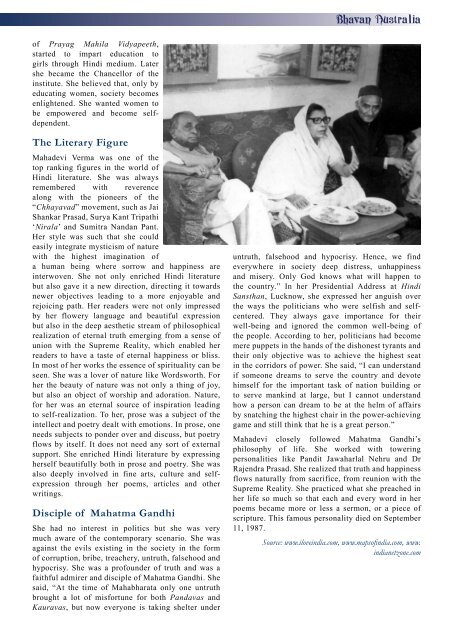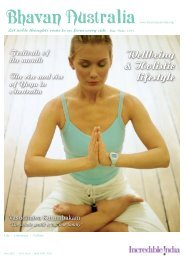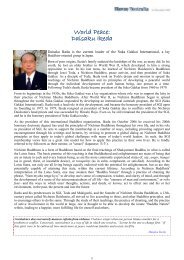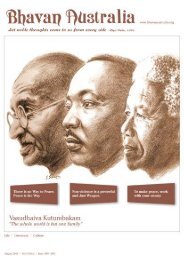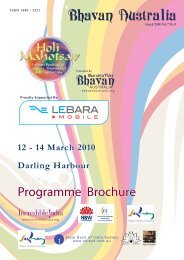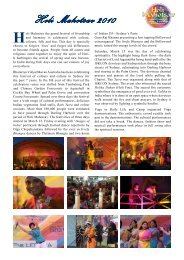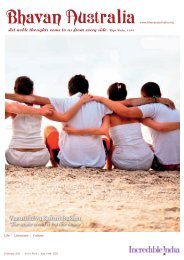'The whole world is but one family' - Bharatiya Vidya Bhavan Australia
'The whole world is but one family' - Bharatiya Vidya Bhavan Australia
'The whole world is but one family' - Bharatiya Vidya Bhavan Australia
You also want an ePaper? Increase the reach of your titles
YUMPU automatically turns print PDFs into web optimized ePapers that Google loves.
of Prayag Mahila <strong>Vidya</strong>peeth,<br />
started to impart education to<br />
girls through Hindi medium. Later<br />
she became the Chancellor of the<br />
institute. She believed that, only by<br />
educating women, society becomes<br />
enlightened. She wanted women to<br />
be empowered and become selfdependent.<br />
The Literary Figure<br />
Mahadevi Verma was <strong>one</strong> of the<br />
top ranking figures in the <strong>world</strong> of<br />
Hindi literature. She was always<br />
remembered with reverence<br />
along with the pi<strong>one</strong>ers of the<br />
“Chhayavad” movement, such as Jai<br />
Shankar Prasad, Surya Kant Tripathi<br />
‘Nirala’ and Sumitra Nandan Pant.<br />
Her style was such that she could<br />
easily integrate mystic<strong>is</strong>m of nature<br />
with the highest imagination of<br />
a human being where sorrow and happiness are<br />
interwoven. She not only enriched Hindi literature<br />
<strong>but</strong> also gave it a new direction, directing it towards<br />
newer objectives leading to a more enjoyable and<br />
rejoicing path. Her readers were not only impressed<br />
by her flowery language and beautiful expression<br />
<strong>but</strong> also in the deep aesthetic stream of philosophical<br />
realization of eternal truth emerging from a sense of<br />
union with the Supreme Reality, which enabled her<br />
readers to have a taste of eternal happiness or bl<strong>is</strong>s.<br />
In most of her works the essence of spirituality can be<br />
seen. She was a lover of nature like Wordsworth. For<br />
her the beauty of nature was not only a thing of joy,<br />
<strong>but</strong> also an object of worship and adoration. Nature,<br />
for her was an eternal source of inspiration leading<br />
to self-realization. To her, prose was a subject of the<br />
intellect and poetry dealt with emotions. In prose, <strong>one</strong><br />
needs subjects to ponder over and d<strong>is</strong>cuss, <strong>but</strong> poetry<br />
flows by itself. It does not need any sort of external<br />
support. She enriched Hindi literature by expressing<br />
herself beautifully both in prose and poetry. She was<br />
also deeply involved in fine arts, culture and selfexpression<br />
through her poems, articles and other<br />
writings.<br />
D<strong>is</strong>ciple of Mahatma Gandhi<br />
She had no interest in politics <strong>but</strong> she was very<br />
much aware of the contemporary scenario. She was<br />
against the evils ex<strong>is</strong>ting in the society in the form<br />
of corruption, bribe, treachery, untruth, falsehood and<br />
hypocr<strong>is</strong>y. She was a profounder of truth and was a<br />
faithful admirer and d<strong>is</strong>ciple of Mahatma Gandhi. She<br />
said, “At the time of Mahabharata only <strong>one</strong> untruth<br />
brought a lot of m<strong>is</strong>fortune for both Pandavas and<br />
Kauravas, <strong>but</strong> now every<strong>one</strong> <strong>is</strong> taking shelter under<br />
untruth, falsehood and hypocr<strong>is</strong>y. Hence, we find<br />
everywhere in society deep d<strong>is</strong>tress, unhappiness<br />
and m<strong>is</strong>ery. Only God knows what will happen to<br />
the country.” In her Presidential Address at Hindi<br />
Sansthan, Lucknow, she expressed her angu<strong>is</strong>h over<br />
the ways the politicians who were self<strong>is</strong>h and selfcentered.<br />
They always gave importance for their<br />
well-being and ignored the common well-being of<br />
the people. According to her, politicians had become<br />
mere puppets in the hands of the d<strong>is</strong>h<strong>one</strong>st tyrants and<br />
their only objective was to achieve the highest seat<br />
in the corridors of power. She said, “I can understand<br />
if some<strong>one</strong> dreams to serve the country and devote<br />
himself for the important task of nation building or<br />
to serve mankind at large, <strong>but</strong> I cannot understand<br />
how a person can dream to be at the helm of affairs<br />
by snatching the highest chair in the power-achieving<br />
game and still think that he <strong>is</strong> a great person.”<br />
Mahadevi closely followed Mahatma Gandhi’s<br />
philosophy of life. She worked with towering<br />
personalities like Pandit Jawaharlal Nehru and Dr<br />
Rajendra Prasad. She realized that truth and happiness<br />
flows naturally from sacrifice, from reunion with the<br />
Supreme Reality. She practiced what she preached in<br />
her life so much so that each and every word in her<br />
poems became more or less a sermon, or a piece of<br />
scripture. Th<strong>is</strong> famous personality died on September<br />
11, 1987.<br />
Source: www.iloveindia.com, www.mapsofindia.com, www.<br />
indianetz<strong>one</strong>.com


